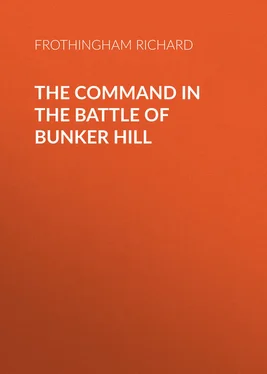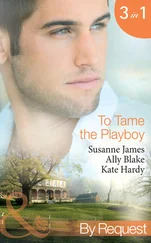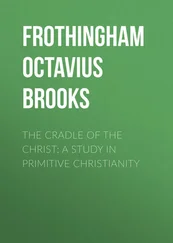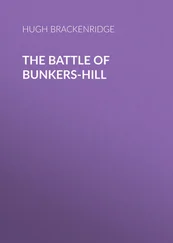Richard Frothingham - The Command in the Battle of Bunker Hill
Здесь есть возможность читать онлайн «Richard Frothingham - The Command in the Battle of Bunker Hill» — ознакомительный отрывок электронной книги совершенно бесплатно, а после прочтения отрывка купить полную версию. В некоторых случаях можно слушать аудио, скачать через торрент в формате fb2 и присутствует краткое содержание. Жанр: foreign_antique, foreign_prose, на английском языке. Описание произведения, (предисловие) а так же отзывы посетителей доступны на портале библиотеки ЛибКат.
- Название:The Command in the Battle of Bunker Hill
- Автор:
- Жанр:
- Год:неизвестен
- ISBN:нет данных
- Рейтинг книги:5 / 5. Голосов: 1
-
Избранное:Добавить в избранное
- Отзывы:
-
Ваша оценка:
- 100
- 1
- 2
- 3
- 4
- 5
The Command in the Battle of Bunker Hill: краткое содержание, описание и аннотация
Предлагаем к чтению аннотацию, описание, краткое содержание или предисловие (зависит от того, что написал сам автор книги «The Command in the Battle of Bunker Hill»). Если вы не нашли необходимую информацию о книге — напишите в комментариях, мы постараемся отыскать её.
The Command in the Battle of Bunker Hill — читать онлайн ознакомительный отрывок
Ниже представлен текст книги, разбитый по страницам. Система сохранения места последней прочитанной страницы, позволяет с удобством читать онлайн бесплатно книгу «The Command in the Battle of Bunker Hill», без необходимости каждый раз заново искать на чём Вы остановились. Поставьте закладку, и сможете в любой момент перейти на страницу, на которой закончили чтение.
Интервал:
Закладка:
4. The next alleged error relates to the case of Captain Callender. Mr Swett lets his pen run as follows: "If any thing could be more wonderful than the author's mistaking one hill for another, when both have been before his eyes from his birth, it would be his adducing this case as one of disobedience, or a case of any kind to disprove that Putnam was the commander," p. 12. This indeed would be wonder upon wonder – if it were only true. But that I mistook Prospect Hill for Bunker Hill is one fancy; that this case of Callender is cited to disprove that Putnam was the commander, is another fancy. Where is it so "adduced?" Really Mr Swett's devotion to his hero leads him into strange misapprehensions. The reader will look in vain for such mistakes and citations in the pages of the Siege of Boston. Once more I ask, what in the name of common sense does Mr Swett mean? On page 164 of the Siege this very case is "adduced" among the things that bear in favor of Putnam, and no where is it cited against his "claims!" The very report made to the provincial congress, which Mr Swett accuses me of neglecting , was thoroughly studied, ( and Mr Swett knew it ) and is fairly quoted, and in favor of Putnam! Indeed this report, and the evidence given on the trial of Colonel Scammans were the main authorities for stating that General Putnam gave orders to the reinforcements.
But the strictures on pages 12, 13, relative to Callender, were not enough, and so Mr Swett (p. 22) adverts to this case again, and says: – "But allow the gentleman, as in regard to Callender, to manufacture his own case, grossly regardless of all known facts." What case have I manufactured? What " known facts " have I been regardless of? The chief thing that appears to be specified in this case is this: – "The author's declaration that Callender was tried for disobedience 27th June, seems to be a poetic license. Ward orders the court martial at that time, without the slightest intention of such a charge," p. 13. Why does not Mr Swett quote my language? But 1. He alludes here, I presume, to a remark (p. 185) of the Siege, when the question of command is not alluded to , but where an account is given of Callender, and it reads – "Capt. Callender, for disobedience of orders and alleged cowardice was tried June 27th." And again I say – "Captain Callender despised the charge of cowardice , and determining to wipe out the unjust stigma ," &c. Now what sort of "license" has Mr Swett taken with my "declaration"? Something more than a poet's license, I fancy! 2. Any one would suppose, from Mr Swett's words, that Ward's order for a court martial specified what the charge was. Here it is – June 27, "The general orders that a general court martial be held this day at the lines, to try Captain Callender of the train of artillery. Witnesses on both sides to be duly summoned to attend a court which is to sit at 8 o'clock A. M., Col. Little president, Capt. Mosely judge advocate." What light does this throw on the matter? And what must be said of the character of Mr Swett's appeal to it ?
5. Mr Swett, in denying that a portion of the troops refused to obey General Putnam, writes as follows: – "Now, we say with the utmost confidence, that, any few cases of cowardice out of the question, no military despot was ever obeyed with more implicit subjection than Putnam was throughout the battle, by every one, officers and men," – p. 10. This, coming from so thorough an investigator, from a thirty years' student of the battle, is worth examination; though, had it come from another, it might be passed over with the simple remark, that it indicated more dogmatism than knowledge. Mr Swett, however, confesses that he is leading "a forlorn hope."
Now General Putnam had little or nothing to do with the original detachment, if the two hundred Connecticut men, after they got to the rail fence, be excepted. There is no proof that he gave an order to it throughout the whole affair, but on the contrary, this is denied in the strongest terms. But his principal service was rendered in connection with the reinforcements, which arrived at the scene of action in the afternoon. After the first attack, he rode to Bunker Hill, and to the rear of it, to urge them forward. But they hesitated. He used every effort, especially, it is stated, at Charlestown Neck and on Bunker Hill, to overcome this reluctance. He ordered, entreated, encouraged and threatened, but all in vain. "The plea was" – I quote a report made in 1775 – "the artillery was gone, and they stood no chance for their lives in such circumstances, declaring they had no officers to lead them." They could not be prevailed upon to go where fighting was, and so large bodies of the troops remained out of the action. This fact is one of the most reliable, as well as most discreditable, relative to the battle. In truth, the state of things on Bunker Hill and in the rear of it, during the afternoon, was more like positive disobedience, than like "implicit subjection." However it may have been at Prescott's post there was no such efficient command in other parts of the field as is expressed in Mr Swett's language, anything he has written, or may write, to the contrary notwithstanding. There was confusion when he leaves the inference that there was order. The evidence on this point is conclusive – overwhelming.
Thus Captain Chester (1775) states: – "Those that came up as recruits were most terribly frightened, many of them, and did not march up with that true courage that their leader ought to have inspired them with." William Tudor (1775) says – "They were discouraged from advancing." Rev. John Martin (1775) says – "During the whole or most of the action Colonel Gerrish, with one thousand men was at the bottom of Bunker Hill and ought to have come up but did not." Contemporary authority as decisively connects General Putnam with the reinforcements. This is not denied. Thus Daniel Putnam, his son, states that he rode to the rear "to urge on reinforcements;" and Stiles states that he left the field to urge them on. Mr Swett, in his history, has no such "implicit subjection." He relates (p. 35) the efforts Putnam made at Charlestown Neck to induce the reinforcements that reached there to pass across; and although he " entreated, encouraged, and threatened ," he could only get " some of the troops " "to venture over." Again, when Gerrish was on Bunker Hill with part of his regiment, the men disorganized and dispersed, "Putnam" — it is Mr Swett who writes this – " ordered them on to the lines ; he entreated and threatened them, and some of the most cowardly he knocked down with his sword, but all in vain !" Once more, p. 41, he says – "Putnam rode to the rear and exhausted every art and effort to bring them on. Capt. Bailey only reached the lines." The evidence as to the confusion is equally clear. John Pitts (1775) says – "There never was more confusion and less command." In Major Gridley's sentence (1775) emphatic allusion is made to "the great confusion that attended" the transactions. Captain Chester (1775) says of things on Bunker Hill near the close of the battle – "When we arrived there was not a company in any kind of order." But why multiply testimony on this point? Mr Swett himself says, in his history, p. 50 – "Great allowance must be made for those unable, and those unwilling to go on; the men went on or off as they pleased and when they pleased !"
Now with such evidence – and this is but a tithe of what may be adduced – is it not surprising that such a claim of efficient command should be set up at this late day, with nothing but bare assertion to support it? If it were so, if there were this implicit subjection, this ready obedience, the enemies of General Putnam might ask with force, what they have asked in weakness – 'Why, if he was so obeyed, were not the troops at the lines? Could he not have led them up?' To affirm that he was obeyed implicitly , by officers and men, and then to be obliged to admit that those he commanded were not in battle raging a stone's throw off , is to place the brave old general in an awkward position, a position he never filled in his life time. Mr Swett's zeal here lacks discretion.
Читать дальшеИнтервал:
Закладка:
Похожие книги на «The Command in the Battle of Bunker Hill»
Представляем Вашему вниманию похожие книги на «The Command in the Battle of Bunker Hill» списком для выбора. Мы отобрали схожую по названию и смыслу литературу в надежде предоставить читателям больше вариантов отыскать новые, интересные, ещё непрочитанные произведения.
Обсуждение, отзывы о книге «The Command in the Battle of Bunker Hill» и просто собственные мнения читателей. Оставьте ваши комментарии, напишите, что Вы думаете о произведении, его смысле или главных героях. Укажите что конкретно понравилось, а что нет, и почему Вы так считаете.












